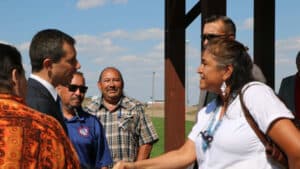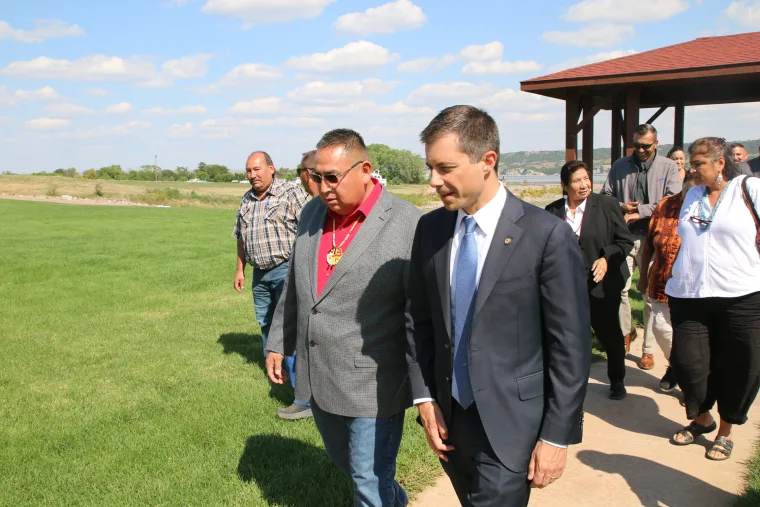Honor Yellow Bird Woman with fulfillment of Cobell Settlement terms
Buttigieg meets with SD tribes to discuss transportation issues
The bipartisan infrastructure law aims to provide millions in funding to tribal nations
Amelia Schafer
ICT + Rapid City Journal

U.S. Department of Transportation Secretary Pete Buttigieg met with South Dakota tribal leaders on Sept. 11 in Oacoma to discuss transportation issues facing Indian Country. (Photo courtesy of DOT)
Leaders from nine South Dakota tribes met with U.S. Secretary of Transportation Pete Buttigieg on Monday, Sept. 11, to discuss transportation issues affecting tribes, including roadway safety, emergency response and public transportation.
“A lot of tribal citizens don’t have access to a vehicle and that’s why Tribal Transit and safer road design are so important,” Buttigieg said. “And then the broader issue of missing and murdered women is something that I also believe has links to transportation policy, because if we create better, safer ways for women to get to where they need to be, hopefully, fewer of them are likely to be victimized in that way.”
As of 2019, approximately 16,920 miles of the BIA-operated system roads are unimproved and earth surface roads, and 4,790 roads are gravel. The BIA controls about a quarter of reservation roads in the Nation. The construction costs were estimated to be $390 million.
Additionally, tribal communities have some of the highest pedestrian deaths in the country, according to DOT officials.
Many tribal nations are also ill-equipped to keep up with emergency situations.
In Dec. 2022, thousands on the Pine Ridge reservation were trapped in their homes after a major winter storm coated the reservation with more than 30 inches of snow. Tribal officials didn’t have the proper equipment to clear roadways, and some homes were only reachable by snowmobile for over a week.

“When you talk with tribal transportation leaders about the number of miles of road they’re responsible for maintaining and the dollars that are coming in, it just doesn’t match up,” Buttigieg said. “That’s one of the reasons why we’ve been pushing to get more funds there. We’re very focused on putting the increase in the tribal transportation programs to work and we know there’s more work to be done and we need to continue identifying more sources of funds to go to this.”
Buttigieg visited South Dakota tribes Monday to discuss the Bipartisan Infrastructure Bill, which aims to provide $431.6 billion in grants for states, tribes, and utilities to rebuild roads, bridges and rails, and expand access to clean drinking water and access to high-speed internet.
So far South Dakota tribes have received $43.9 million in discretionary funds through the Infrastructure law and before that through the American rescue plan.
“We’ve had good conversations in DC, but we don’t want tribal leaders and citizens to have to come to DC to be heard, which is why I’m right here on the ground in South Dakota,” Buttigieg said.
Previously Buttigieg has visited tribal leaders in northern Alaska, on the Hopi Reservation and the Navajo Nation.
“For large land-based tribes like many of those here in South Dakota, to the Alaskan Native communities to places you see, or those in New England or the Pacific Northwest, everybody’s got unique needs and we’re trying to make sure that we meet every tribal community where they are,” Buttigieg said.
This story is co-published by the Rapid City Journal and ICT, a news partnership that covers Indigenous communities in the South Dakota area.
The funding supports prevention and treatment services
Bolstering cultural outreach and personal development among honorees’ top goals
Surveillance video released through records request shows disturbance in the water
Missing woman’s body found on Turtle Mountain Reservation
From early-morning strategy sessions to last-minute resolution edits, the Buffalo’s Fire and IMFA team hit the ground to report on the priorities shaping Indian Country






